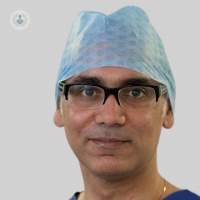Benign prostatic hyperplasia: symptoms, diagnosis, and treatment
Written in association with:Top Doctors recently had the pleasure of speaking to highly regarded and skilled London-based consultant urologist, Mr Sarb Sandhu, to find out what benign prostatic hyperplasia is, how it is managed effectively, and when surgery is required to treat the symptoms that the condition causes.

What is benign prostatic hyperplasia?
This refers to the growth of one’s prostate. As the prostate grows, urination is affected, with some people experiencing a slower flow or urine, or even stopping urinating altogether.
A man, as a result, may feel incomplete emptying, they may have to rush to the toilet, and they may suffer from urinary incontinence.
How is it diagnosed and treated?
Diagnosis involves listening to the man’s symptoms to make sure he doesn’t have prostate cancer by doing a blood test and thorough examination. Then, we will usually perform an ultrasound scan and a flow rate, to determine how much urine he is passing. This will let us know if the patient has benign prostatic hyperplasia or not.
How is it managed most effectively?
Some patients seek the use of prescribed medication. Minimally invasive surgery is also an option for patients suffering from the condition. Rezum, HoLEP, and UroLift are the three very effective surgical options.
Is surgery ever required?
Surgery is certainly required for men who stop urinating. Other individuals with a slow flow or who pass urine frequently will also be helped through a surgical intervention, but it is not necessary.
How can men reduce their chances of experiencing this condition?
Having a good lifestyle, a diet that is low in fatty meats, and controlling your weight, will all really help prevent on onset of benign prostatic hyperplasia. There are also some medications people can take to reduce their chances of suffering from the condition.
If you are worried that you may be currently suffering from benign prostatic hyperplasia or if you feel as though you are experiencing any of the abovementioned symptoms, contact Mr Sarb Sandhu today via his Top Doctors profile to book a consultation.


